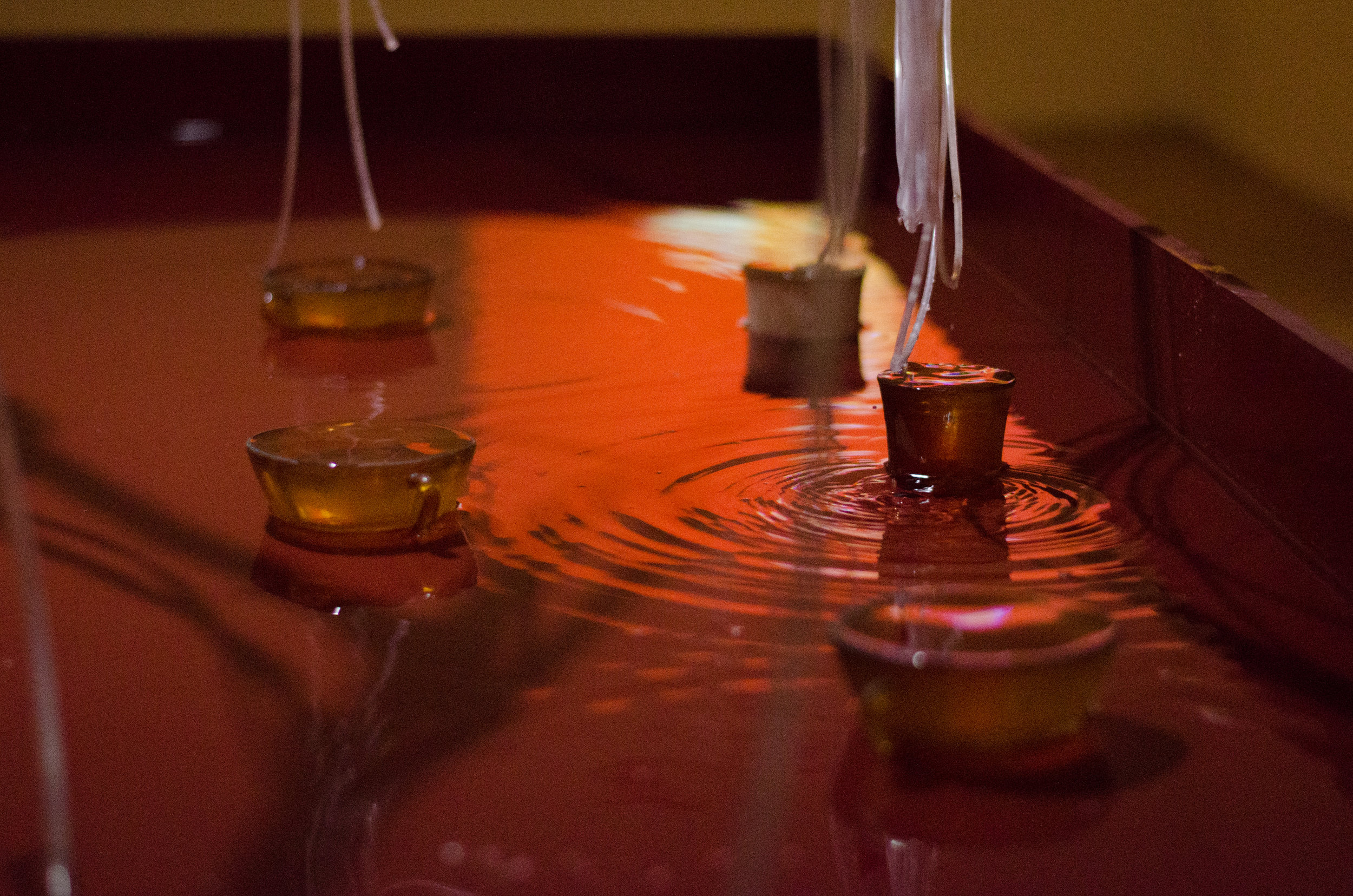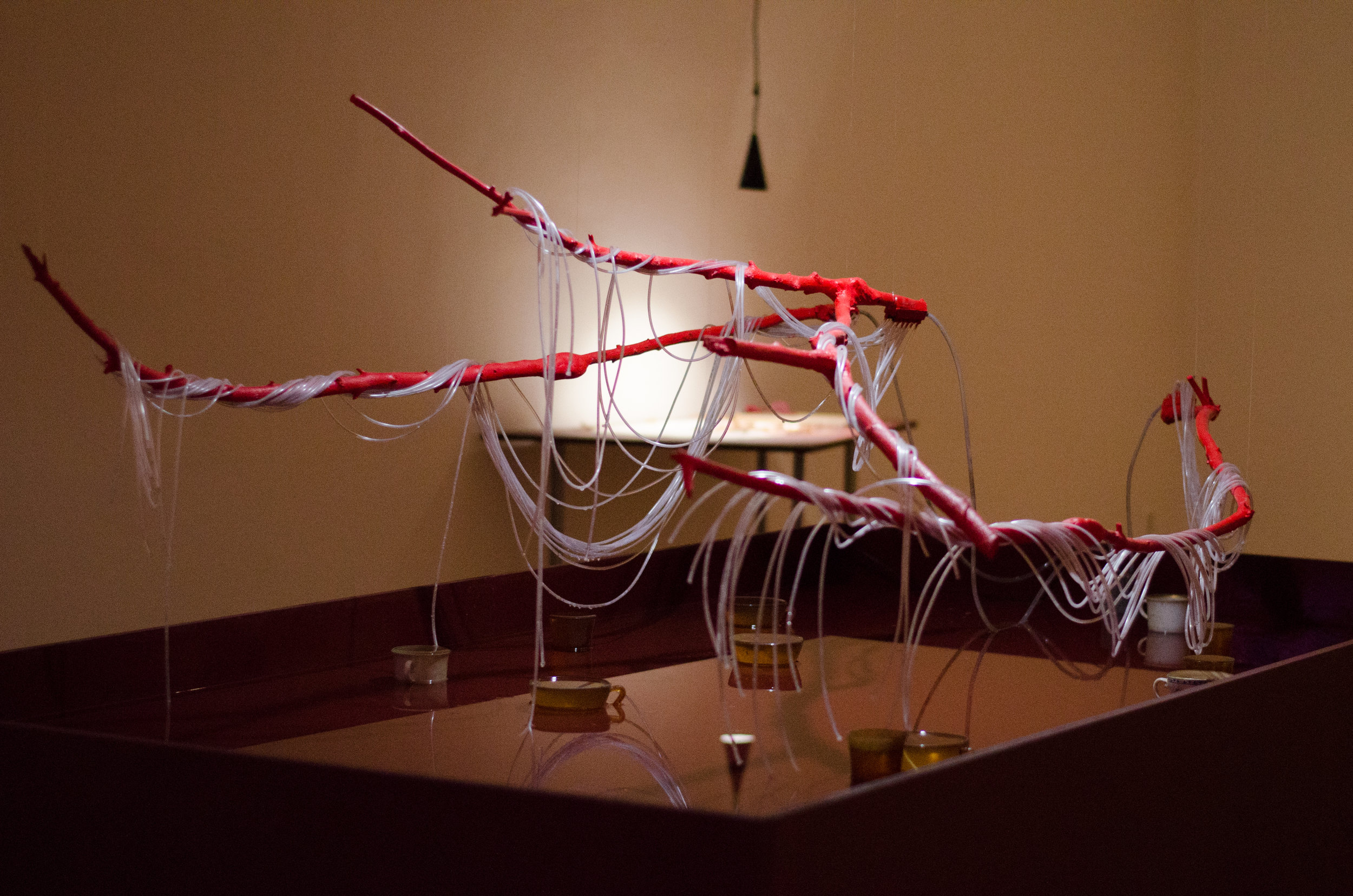
The imaginary becomes complete
In "The imaginary becomes complete on the margins of every new linear projection" and "As the Flames Engulfed the River", I examine the effects of colonialism and the emergence of these radical, decolonising knowledges on birth control and abortion from a more personal angle. In the installation, I start from my memories of ayoowiri growing in the banks of the Maracanã river, in my neighborhood in Rio, to speculate on its presence in the banks of rivers that flow through the places where my mother, my grandmother, and my great-grandmothers grew up. We are all from coastal regions of Brazil; my mother, grandmother and I are all from different regions of Rio, and I only have information about one of my great-grandmothers (this, too, is significant: most were migrants, undocumented and unregistered, and had no relatives). The one great-grandmother I know about was from an indigenous village that grew to become a small town in Northeastern Brazil. All of the rivers that were present in these places end, ultimately, in the Atlantic Ocean – a body of water that holds such a key role in the history of colonialism. These histories of movement, migration and displacement, are histories that originate in marginality and errantry – to nod at Glissant; but they are also histories of a successive assimilation to an increasingly Westernized Brazilian society. I was not born in the poverty that my mother lived in, and whose marks she carries with her.
I first started thinking about these trees in relation to the histories of women in my family because there is a story, always told in whispers, that one of us once needed an abortion. I am not going to name who this was, nor give too many details because I don't think this is my story to tell. At the time this happened, this person was living in poverty; a neighbor came to her help, and gave her an abortion using a herbal preparation. I don't know what that preparation was, but I always wonder if ayoowiri was used. And I always think how terrifying it must have been for her to do this, going against everything that her very Catholic upbringing taught her. The moment when she chose to do this, in spite of everything, and the help and compassion that she found in her neighbor opened up, in many ways, new realities. This type of radical care amongst communities who have been historically marginalized by coloniality can reframe the past, point toward alternative presents, and create new, plural futures. So in this installation I reenact the moment when the ayoowiri tea meets the saliva, this moment where new timelines emerge. I've used a number of tree branches that I collected around my neighborhood in Berlin (which is, too, in a marginalized part of the city, though I'm starting to see the first signs of gentrification now) to trace the profiles of three rivers: the one that cut through my mother and grandmother's neighborhood, the one I remember growing up, and the one that flows around my great-grandmother's town. I've set up an irrigation system in the branches from which the tea flows, dripping systematically into a number of cups placed on the floor.
The imaginary becomes complete on the margins of every new linear projection (2018)
Sculpture, 250 x 130 x 135 cm
Tree branches, acrylic paint, water, teacups, plant irrigation system, wood.
This sculpture is formed by three groups of tree branches. From the branches, water drips into a number of teacups placed on a table underneath. The branches mimic the shapes of three rivers in Brazil: Maracanã, Pedras (both located in Rio de Janeiro, Tamoio land), and Guedes (located around Palmeira dos Índios, in the state of Alagoas, Xukuru Kariri land).
The piece interrogates my own memories of peacock flower trees — also known as ayoowiri — growing in the banks of the Maracanã river, in Rio de Janeiro. During the European occupation of Brazil, the bark and leaves of ayoowiri was used for their abortifacient properties by enslaved Indigenous and African communities; a form of decolonising resistance rooted in notions of radical care and solidarity. The sculpture examines the plant’s presence in the riverbanks that flow through places significant to my mother, grandmother, and great-grandmother, connecting our own experiences with abortion to the broader structures of colonialism, migration, sexual domination, bioprospecting, and the Atlantic. The incessant dripping from branches to teacups and back amplifies the moment of encounter between body and plant, echoing my own experience with abortion to those of generations that came before me.
The title of this work derives from a quote by Édouard Glissant’s “Poetics of Relation,” where he writes:
[The imaginary] works in a spiral: from one circularity to the next, it encounters new spaces and does not transform them into either depths or conquests. Nor is it confined to the binarities that have seemed to preoccupy me throughout this book: extension/filiation, transparency/ opacity . . . The imaginary becomes complete on the margins of every new linear projection. It creates a network and constitutes volume. Binarities only serve as conveniences for approaching its weave.
Commissioned by Art Lab Gnesta.
An interview with curator Meryem Saadi about this work and “As Flames Engulfed the River” can be found here.

Interview to curator Sebastian Dahlqvist. Video produced by Art Lab Gnesta. Filmed and edited by Peter Olsén.






